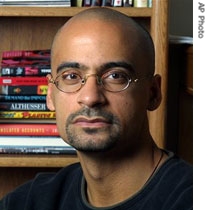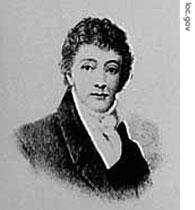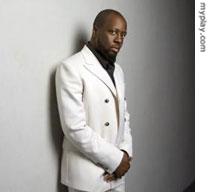VOA慢速英语 2008 0328b
搜索关注在线英语听力室公众号:tingroom,领取免费英语资料大礼包。
(单词翻译)
AMERICAN MOSAIC1 - Wyclef Jean Mixes Hip-Hop, Reggae and World Music in New 'Carnival2'
Also: A question from Laos about the national anthem3. And a report on award-winning writer Junot Diaz. Transcript4 of radio broadcast:
27 March 2008
HOST:
Welcome to AMERICAN MOSAIC in VOA Special English.
(MUSIC)
I’m Doug Johnson. On our show this week:
New music from Wyclef Jean …
A question from Laos about the national anthem …
And a report on the award-winning fiction writer Junot Diaz.
(MUSIC)
Junot Diaz
HOST:
Junot Diaz is an American writer who was born in the Dominican Republic. He immigrated5 to the United States with his family when he was six years old. Several critics listed his latest book, “The Brief Wondrous6 Life of Oscar Wao,” as one of the best books of last year. This month it won the National Book Critics Circle Award for fiction. The book tells the story of Oscar de Leon, his family, and their Dominican roots. But the book is also about language, popular culture and the role of history in a family’s life. Faith Lapidus has more.
FAITH LAPIDUS:
 |
| Junot Diaz |
The hero of “The Brief Wondrous Life of Oscar Wao” is a fat, smart and lonely young man who spends his time writing science fiction stories. Oscar’s sister Lola and her boyfriend tell the story of Oscar and his family. You learn about Abelard Cabral, Oscar’s grandfather whose life is destroyed because he opposed the Dominican dictator Rafael Trujillo. You learn about Oscar’s mother Belicia who moves to the United States after a painful love affair. And you learn about the life of Oscar and Lola as they grow up in the Hispanic neighborhoods near New York City.
One critic said this book establishes Junot Diaz as one of the most important voices in current literature. Diaz's writing is funny, intense and imaginative. It is also informative7 because he describes historic events in the Dominican Republic. He includes many Spanish words in the book to express the cultural ties of his characters. Here is a recording8 of Junot Diaz talking about the effect of using a language that some readers will not understand. He spoke9 at the Key West Literary Seminar in Florida in January.
JUNOT DIAZ: “There’s always a part of every message that gets lost and misinterpreted and not heard. The dream of perfect communication is a wonderful dream. It doesn’t exist. And unintelligibility10 is not a misfire of language, it’s a very vital and important component11 of it. And I always thought that in real life we have no problems with unintelligibility. You know, we’re more than happy not to hear ten, to fifteen or twenty percent of conversations and we sort of accept it. But in a book it becomes a different matter, right?”
Junot Diaz teaches writing at the Massachusetts Institute of Technology in Cambridge. His first book, “Drown,” was published in nineteen ninety-six. In this collection of stories, Diaz tells about the experiences of Dominican Americans like himself. He has said that even though he has lived in the United States most of his life, he still feels like an outsider. He says his children might feel American. But he says he is an immigrant and will stay an immigrant forever.
(MUSIC)
Star-Spangled Banner
HOST:
Our question this week comes from Laos. A VOA listener named Davanh wants to know more about the national anthem.
 |
| Francis Scott Key |
We begin our explanation in eighteen fourteen, during the second war between America and Britain. A young American lawyer and poet, Francis Scott Key, was being held on a British ship in the Chesapeake Bay. He had gone aboard the ship to negotiate the release of a doctor from Maryland who had been arrested by British forces.
But during the negotiations12, Francis Scott Key had learned of some British military plans. So the British refused to free him until after they carried out their plan to attack Fort McHenry in Baltimore, Maryland.
The attack began the morning of September thirteenth. Francis Scott Key watched the shells and rockets fall on Fort McHenry in Baltimore Harbor.
The American doctor detained on the ship also watched the fighting. He kept asking Francis Scott Key if the Stars and Stripes, the American flag, still flew over the fort. The doctor had difficulty seeing it for himself. The lawyer and poet could see the flag, until darkness fell. The attack went on through the night.
At sunrise the next morning, Francis Scott Key saw the American flag still flying over Fort McHenry. That sight, and the battle that came before it, led him to take an old letter from his pocket. On it he wrote a poem about what he had seen. He called it "The Defence of Fort McHenry."
After his release on September sixteenth, Francis Scott Key worked on the poem some more. His final version was published a short time later. Key had called for it to be sung to the tune13 of the "Anacreontic Song." The Anacreontic Society was a group of amateur musicians in London.
Later a music store published the words and music under the name “The Star-Spangled Banner.” Congress passed a bill declaring it the national anthem in nineteen thirty-one. President Herbert Hoover signed the bill into law.
The Library of Congress says there is strong evidence that the members of the Anacreontic Society liked to drink. But it says there is little basis to the belief that the national anthem was an old English drinking song.
(MUSIC)
Wyclef Jean
HOST:
Wyclef Jean is a singer, musician, producer and activist14 who has been making music for twenty years. His latest album is called "Carnival Volume II: Memoirs15 of an Immigrant." The first album, "The Carnival," came out ten years ago. "Carnival II" combines hip-hop, reggae and world music, and also includes guest performers. Mario Ritter has more.
(MUSIC)
MARIO RITTER:
 |
| Wyclef Jean |
That was "Hollywood Meets Bollywood," Wyclef Jean with the rapper Chamillionaire. The song is a good example of how Wyclef Jean likes to mix musical styles from different cultures.
He started singing at the age of three in his father’s church in Haiti. An album his father gave him by the Christian16 groups Petra and Stryper was Wyclef’s introduction to rock music.
Twenty years ago he joined the Fugees. The band became popular in the nineteen nineties with hits like their remake of “Killing Me Softly.” In nineteen ninety-seven, Wyclef Jean left the Fugees to make records on his own.
One singer he has worked with is the Colombian-born Shakira. Here is their latest song, “King and Queen.”
(MUSIC)
Wyclef Jean is also known for his social activism. In two thousand five he formed Yele Haiti. This group works to bring the arts to poor communities there, and to provide food, medicine and educational programs.
We leave you with Wyclef Jean and Mary J. Blige, and a song about the struggles of a divorced father who wants to see his daughter. From "Carnival Volume II," here is "What About the Baby."
(MUSIC)
HOST:
I'm Doug Johnson. I hope you enjoyed our program today.
It was written by Dana Demange and Caty Weaver17, who was also the producer. Join us again next week for AMERICAN MOSAIC, VOA’s radio magazine in Special English.
 收听单词发音
收听单词发音 




